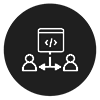Onboarding your new project at the Eclipse Foundation
The Eclipse Foundation Development Process describes a structure and set of principles for successful vendor neutral, commercial friendly open source development. During this session, we will present what creating a new project at the Eclipse Foundation means and implies. We will cover what you need to consider for a successful journey, go through the sequence of process steps from the proposal to provisioning and initial contribution, discuss the IP and licensing topics, and provide a pack of good practices and recommendations.

Open Source Best Practices